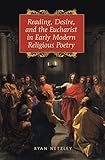Reading, Desire, and the Eucharist in Early Modern Religious Poetry / Ryan Netzley.
Material type: TextPublisher: Toronto : University of Toronto Press, [2016]Copyright date: ©2011Description: 1 online resource (304 p.)Content type:
TextPublisher: Toronto : University of Toronto Press, [2016]Copyright date: ©2011Description: 1 online resource (304 p.)Content type: - 9781442642812
- 9781442694927
- 821/.409382 23
- online - DeGruyter
| Item type | Current library | Call number | URL | Status | Notes | Barcode | |
|---|---|---|---|---|---|---|---|
 eBook
eBook
|
Biblioteca "Angelicum" Pont. Univ. S.Tommaso d'Aquino Nuvola online | online - DeGruyter (Browse shelf(Opens below)) | Online access | Not for loan (Accesso limitato) | Accesso per gli utenti autorizzati / Access for authorized users | (dgr)9781442694927 |
Frontmatter -- Contents -- Acknowledgments -- Introduction: Desiring Sacraments and Reading Real Presence in Seventeenth- Century Religious Poetry -- 1. Take and Taste, Take and Read: Desiring, Reading, and Taking Presence in George Herbert’s The Temple -- 2. Reading Indistinction: Desire, Indistinguishability, and Metonymic Reading in Richard Crashaw’s Religious Lyrics -- 3. Loving Fear: Affirmative Anxiety in John Donne’s Divine Poems -- 4. Desiring What Has Already Happened: Reading Prolepsis and Immanence in John Milton’s Early Poems and Paradise Regained -- Conclusion: Reading Is Love -- Notes -- Bibliography -- Index
restricted access online access with authorization star
http://purl.org/coar/access_right/c_16ec
The courtly love tradition had a great influence on the themes of religious poetry—just as an absent beloved could be longed for passionately, so too could a distant God be the subject of desire. But when authors began to perceive God as immanently available, did the nature and interpretation of devotional verse change? Ryan Netzley argues that early modern religious lyrics presented both desire and reading as free, loving activities, rather than as endless struggles or dramatic quests.Reading, Desire, and the Eucharist analyzes the work of prominent early modern writers—including John Milton, Richard Crashaw, John Donne, and George Herbert—whose religious poetry presented parallels between sacramental desire and the act of understanding written texts. Netzley finds that by directing devotees to crave spiritual rather than worldly goods, these poets questioned ideas not only of what people should desire, but also how they should engage in the act of yearning. Challenging fundamental assumptions of literary criticism, Reading, Desire, and the Eucharist shows how poetry can encourage love for its own sake, rather than in the hopes of salvation.
Mode of access: Internet via World Wide Web.
In English.
Description based on online resource; title from PDF title page (publisher's Web site, viewed 01. Dez 2023)


